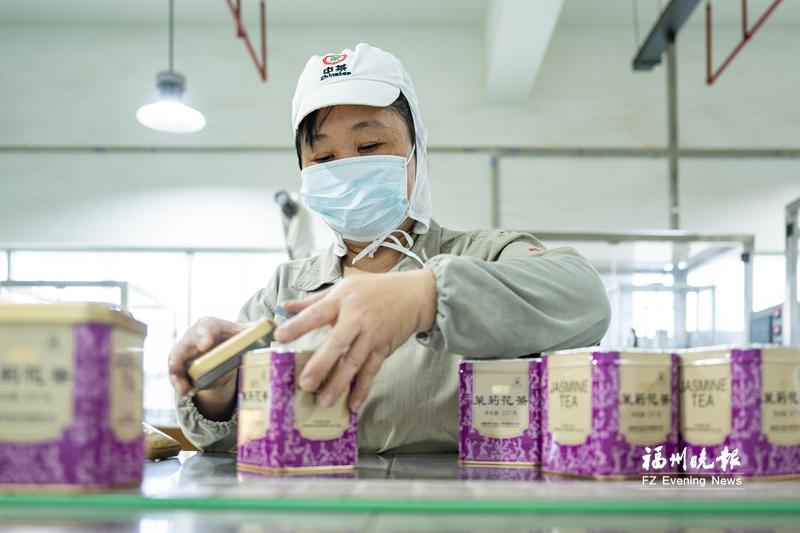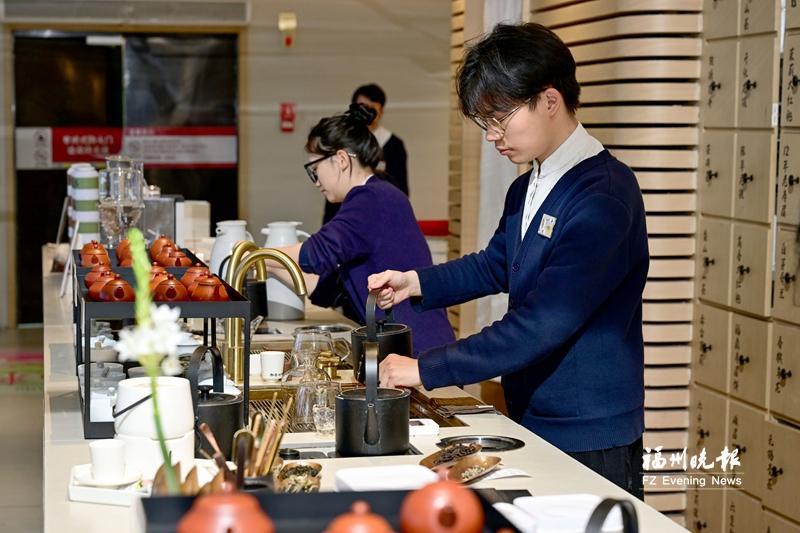Why Can Fuzhou Jasmine Tea Captivate Global Taste Buds?
The brand value exceeds 4.6 billion yuan, with an annual export revenue of about 13 million US dollars
Why Can Fuzhou Jasmine Tea Captivate Global Taste Buds?
According to the 2024 Chinese tea export data released by the Tea Industry Committee of the China Association for the Promotion of International Agricultural Cooperation, the export volume of scented tea reached 7,624.61 tons, a year-on-year increase of 18.11%, while the export value totaled 57,237,300 US dollars, rising by 5.11% year-on-year. Notably, Fuzhou Jasmine Tea performed exceptionally well in 2024, with exports from the Fuzhou Customs District increasing by 6.6% compared to the previous year.
According to publicly available media data, over 30% of the products sold by China’s top ten new tea drink brands last year were made with jasmine tea as the base. On the 16th, the reporter interviewed the Fuzhou Municipal Bureau of Agriculture and Rural Affairs and relevant Fuzhou Jasmine Tea companies to uncover the story behind Fuzhou Jasmine Tea’s captivating global taste buds.
Last year, Fuzhou’s new-style tea drinks used 40,000 tons of jasmine tea
Staff at Dongbai ITEAMO brew jasmine tea as the base to create a variety of tea drinks. (Photo/Reporter Shi Meixiang)
On the 16th, the reporter visited the ITEAMO store of Chunlun Group at Dongbai Center. The store features a range of creative drinks, including Jasmine Bubble Tea, Jasmine Moonlight White Tea, Jasmine Snow, Champagne Oolong, and Handmade Matcha Latte. These drinks mix tea with elements of alcohol and coffee, pushing the boundaries of traditional tea categories while promoting the essence of tea culture. According to statistics, Chunlun Group has opened over 50 new-style tea drink stores nationwide. The Chunlun Sanfang Qixiang store has an average daily sales of 5,000 yuan for tea and milk drinks, with about 50% of its product offerings based on Fuzhou Jasmine Tea.
A leader of Chunlun Group shared that jasmine tea, with its strong aroma and versatility, is considered the perfect match for innovative drinks like fruit tea and milk coffee. To meet growing market demand, Yongtai County and Chunlun Group have worked together to set up a raw material base and plan to establish a nationwide hub for new-style tea drink ingredients, aiming to promote large-scale supply and standardized production.
According to publicly available media data, last summer, 32.32% of the 297 tea products sold by the top ten new tea drink brands in China used jasmine tea as the base. These included offerings such as ChaPanda’s Fresh Milk Jasmine Milk Green, Green Grape Jasmine, Mixue Ice Cream & Tea’s Jasmine Latte Coffee, Auntea Jenny’s Jasmine Milk Green and Jasmine Lemon Tea, as well as Nayuki’s Jasmine First Snow Milk Tea and Jasmine First Snow Tea Coffee.
As one of the main production areas of jasmine tea in China, Fuzhou is quietly changing the landscape of the tea drink industry and establishing a leading presence.
The reporter learned from the Fuzhou Municipal Bureau of Agriculture and Rural Affairs that the local tea company, Jinfengyang, launched “Moyu Tea,” which combines traditional tea scenting techniques with fresh milk and fruit, providing raw materials and technical support to over 500 independent milk tea stores nationwide. In addition, Qingkou Tea has partnered with ChaPanda to establish a 5,000-ton capacity raw leaf tea production base. Last year, ChaPanda’s raw leaf tea production base began operation in Jin’an District. The company will purchase over 2,000 tons of tea leaves annually to supply more than 8,000 stores nationwide.
In addition, in recent years, Fujian Bangli Tea Co., Ltd. has built three modern tea industrial parks in Shouning County, Yongtai County, and Hengzhou City, Guangxi, spanning a total area of 120,000 square meters. The first phase of the project in Yongtai County, with an investment of 100 million yuan, is designed as a “one-stop” modern tea industrial park that combines tea production, tea culture research, and the development of new Chinese-style tea drinks.
“Last year, Fuzhou, as a major production hub, contributed 40,000 tons of jasmine tea to the growing market of new-style tea drinks developed around its unique flavor. Its online sales made up a quarter of the national total. The boom in new-style tea drinks has driven the output value of the entire Fuzhou jasmine tea industry chain to surpass 10 billion yuan,” said a relevant staff member from the Fuzhou Municipal Bureau of Agriculture and Rural Affairs.
With its superior quality, it has secured a place in high-end overseas markets
According to the data released at the 3rd China (Fuzhou) Tea Trade Fair last year, Fuzhou has been exporting around 1,500 tons of jasmine tea annually, generating about 13 million US dollars in foreign exchange over the past five years. As the only city-level tea variety in China with its own dedicated customs tariff code, Fuzhou Jasmine Tea has long been popular in European and American countries, Africa, and Southeast Asia.

A worker is packaging jasmine tea at Fujian Tea Import & Export Co., Ltd. (Photo/Reporter Lin Shuangwei)
Located in Fuzhou, Fujian Tea Import & Export Co., Ltd. is the first company to engage in the jasmine tea trade after the founding of the People’s Republic of China. For more than 60 years, its Butterfly brand jasmine tea products have been sold in most Chinese supermarkets across North America, Europe, Oceania, and Southeast Asia, and have entered mainstream supermarkets in South American countries such as Peru and Chile. As of now, Fujian Tea Import & Export’s export volume of jasmine tea still ranks first in China.
Fuzhou jasmine tea, as an important global agricultural and cultural heritage, has successfully entered the high-end market, leveraging the distinct quality derived from the nine-step scenting process, which is recognized as an intangible cultural heritage.
In 2016, Fujian Chunlun Group established a subsidiary in Paris, France, moving beyond its previous role as a supplier of loose tea raw materials. A relevant leader of the group said that overseas customers have very high requirements for the quality and aroma of jasmine tea. Today, all their exported tea products undergo at least five scenting cycles. Although each additional scenting cycle increases costs by 15%, customers are still willing to pay a premium for the clear quality gradient. As a result, their export value reached nearly 100 million yuan last year, a record high.
Additionally, Chunlun Group has made its way into the French market by incorporating local cuisine, collaborating with a Michelin-starred restaurant on the Champs-Élysées. They’ve introduced creative dishes like jasmine tea-infused scallops and jasmine tea-based desserts, offering a unique twist to French dining. Today, their products are featured in over 30 restaurants, 50 stores, and nearly 2,000 supermarkets, including Carrefour, throughout France.
According to the “2024 China Tea Regional Public Brand Value Evaluation Report”, the brand value of Fuzhou Jasmine Tea has reached 4.684 billion yuan, securing a spot in the “Top 50 China Tea Regional Public Brands,” with its value continuing to grow. According to a relevant staff member from the Fuzhou Municipal Bureau of Agriculture and Rural Affairs, they are currently focusing on the preservation, introduction, and enhancement of jasmine tea germplasm resources and have successfully established the “Global Jasmine Tea Germplasm Resource Protection and Innovation Base.” (Fuzhou Evening News Reporter: Chen Muyi/Text; Shi Meixiang, Lin Shuangwei/Photo)
